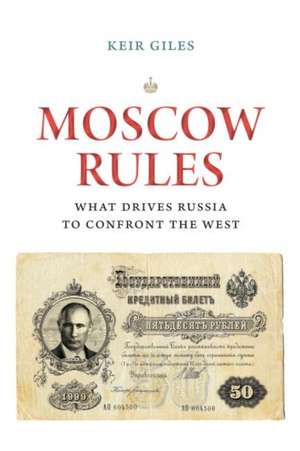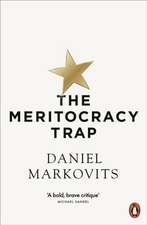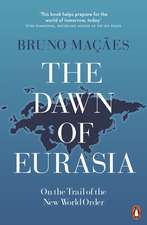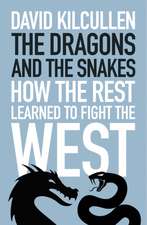Moscow Rules: What Drives Russia to Confront the West: Insights: Critical Thinking on International Affairs
Autor Keir Gilesen Limba Engleză Paperback – 30 sep 2018
From Moscow, the world looks different. It is through understanding how Russia sees the world--and its place in it--that the West can best meet the Russian challenge.
Russia and the West are like neighbors who never seem able to understand each other. A major reason, this book argues, is that Western leaders tend to think that Russia should act as a "rational" Western nation--even though Russian leaders for centuries have thought and acted based on their country's much different history and traditions. Russia, through Western eyes, is unpredictable and irrational, when in fact its leaders from the czars to Putin almost always act in their own very predictable and rational ways. For Western leaders to try to engage with Russia without attempting to understand how Russians look at the world is a recipe for repeated disappointment and frequent crises.
Keir Giles, a senior expert on Russia at Britain's prestigious Chatham House, describes how Russian leaders have used consistent doctrinal and strategic approaches to the rest of the world. These approaches may seem deeply alien in the West, but understanding them is essential for successful engagement with Moscow. Giles argues that understanding how Moscow's leaders think--not just Vladimir Putin but his predecessors and eventual successors--will help their counterparts in the West develop a less crisis-prone and more productive relationship with Russia.
Preț: 246.89 lei
Nou
47.24€ • 49.32$ • 39.10£
Carte disponibilă
Livrare economică 14-28 martie
Livrare express 27 februarie-05 martie pentru 26.94 lei
Specificații
ISBN-10: 081573574X
Pagini: 240
Dimensiuni: 152 x 229 x 18 mm
Greutate: 0.39 kg
Editura: BROOKINGS INSTITUTION
Seria Insights: Critical Thinking on International Affairs
Descriere
From Moscow, the world looks different. It is through understanding how Russia sees the world--and its place in it--that the West can best meet the Russian challenge.
Russia and the West are like neighbors who never seem able to understand each other. A major reason, this book argues, is that Western leaders tend to think that Russia should act as a "rational" Western nation--even though Russian leaders for centuries have thought and acted based on their country's much different history and traditions. Russia, through Western eyes, is unpredictable and irrational, when in fact its leaders from the czars to Putin almost always act in their own very predictable and rational ways. For Western leaders to try to engage with Russia without attempting to understand how Russians look at the world is a recipe for repeated disappointment and frequent crises.
Keir Giles, a senior expert on Russia at Britain's prestigious Chatham House, describes how Russian leaders have used consistent doctrinal and strategic approaches to the rest of the world. These approaches may seem deeply alien in the West, but understanding them is essential for successful engagement with Moscow. Giles argues that understanding how Moscow's leaders think--not just Vladimir Putin but his predecessors and eventual successors--will help their counterparts in the West develop a less crisis-prone and more productive relationship with Russia.
Notă biografică
Cuprins
Contents
Acknowledgments
Introduction
Part I: Russia's Place in the World
1. A World Apart
2. Great Power and Empire
3. Russia under Threat
4. Winning the Cold War
Part II: Russia's Internal System
5. Ruling Russia
6. The Individual and the State
Part III: Russia's Inheritance
7. Russia's Moral Framework
8. History Matters
Part IV: Prospects for Change
9. Opposition, Protests, and Discontent
10. Change from Within
Conclusion: The Way Forward
Notes
Index


























